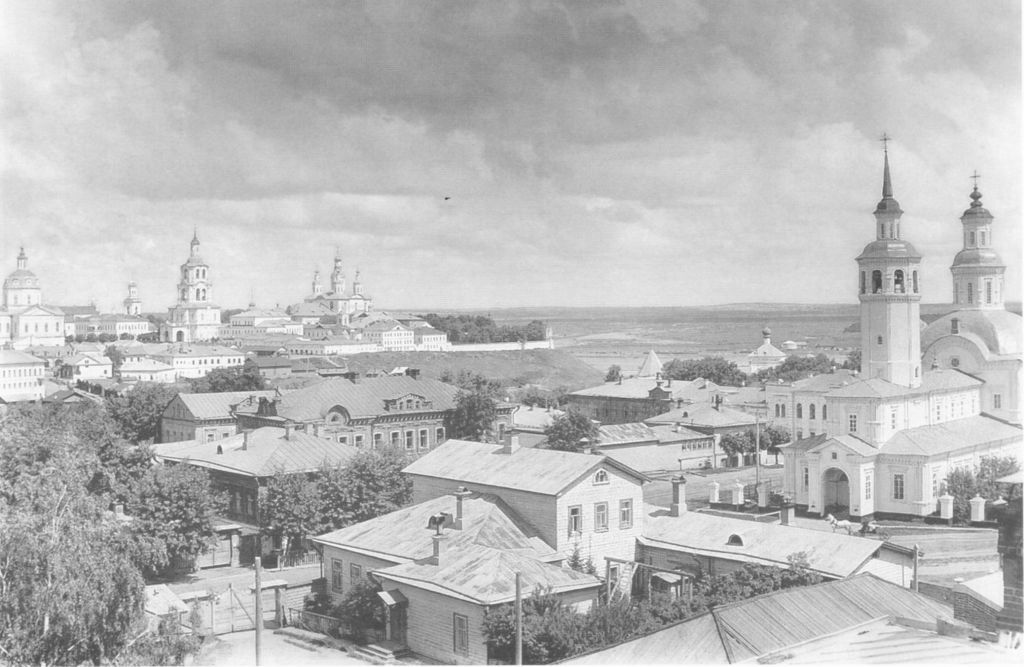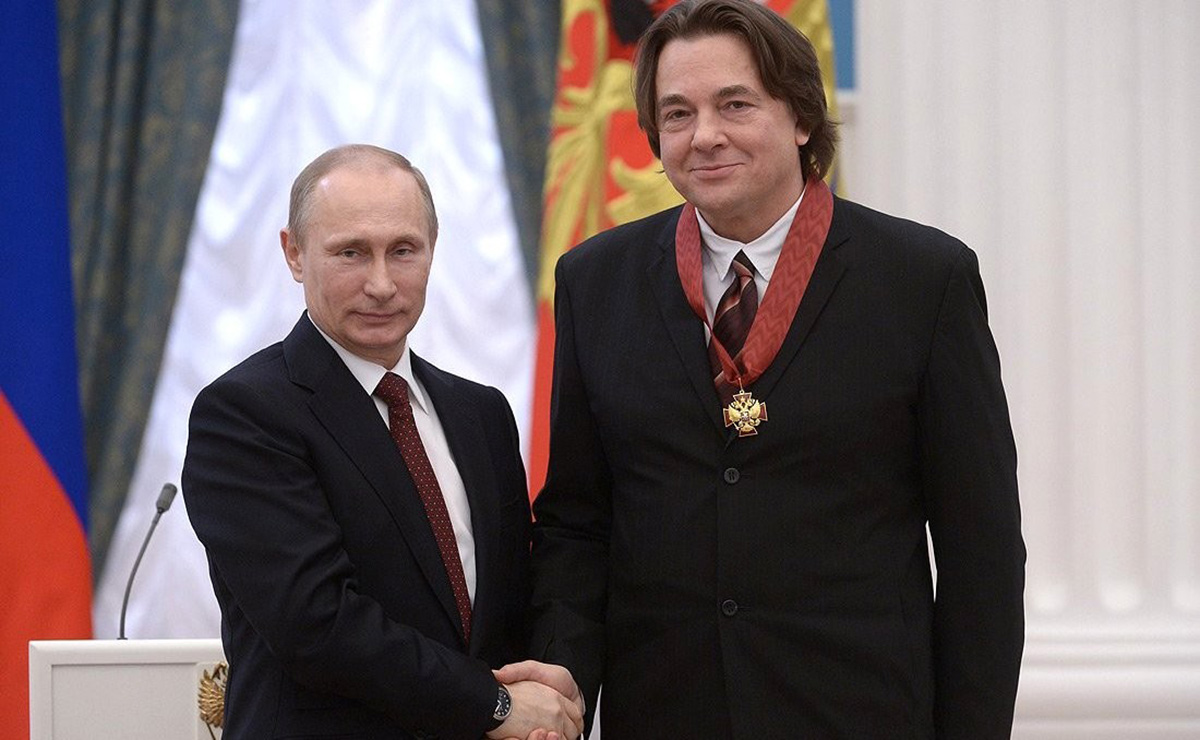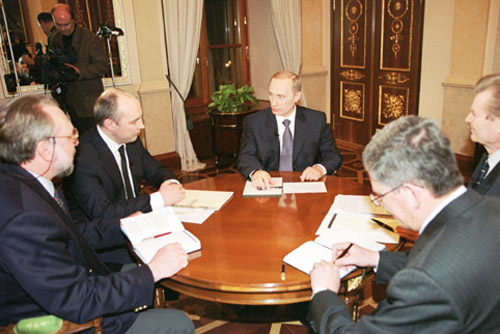|
Zhanna Agalakova
Zhanna Leonidovna Agalakova (russian: –Ц–∞ћБ–љ–љ–∞ –Ы–µ–Њ–љ–ЄћБ–і–Њ–≤–љ–∞ –Р–≥–∞–ї–∞ћБ–Ї–Њ–≤–∞; born 6 December 1965, Kirov) is a Russian journalist, special correspondent, and television news presenter. In 2002 she was nominated for the TEFI Award and in 2006 was awarded the Medal of the Order "For Merit to the Fatherland". Career In 1992 Agalakova became the RIA Novosti news agency's gossip correspondent. From 1996 she broadcast on the NTV (Russia) channel. In October 1999 she joined Channel One Russia, presenting the daytime and evening editions of ''Novosti'' ("News"), as well as the main evening news programme ''Vremya''. In May 2000 she announced the results of the Russian professional jury's voting at the Eurovision Song Contest held in Stockholm. Between 2000 and 2002 she presented the television programme ''Vremena'' together with Vladimir Posner. In September 2005 Agalakova became Channel One Russia's own correspondent in Paris and from January 2013 till August 201 ... [...More Info...] [...Related Items...] OR: [Wikipedia] [Google] [Baidu] |
Kirov, Kirov Oblast
Kirov ( rus, –Ъ–ЄћБ—А–Њ–≤, p=ЋИk ≤ir…Щf, a=Ru-–Ъ–Є—А–Њ–≤.ogg) is the largest city and administrative center of Kirov Oblast, Russia. It is located on the Vyatka River in European Russia, 896 km northeast of Moscow. Its population was 518,348 in 2020. Kirov is a historical, cultural, industrial, and scientific center of Priural'e (territory on the west side of the Ural Mountains); place of origin for Dymkovo toys; the most eastern city founded during the times of Kievan Rus'. The city also had the names of Khlynov (, from 1457 to 1780), and Vyatka (, until 1934). History Principality and republic The native Slavic tribe of Central Russia and Volga regions, the Vyatichis (also called Viatichi), mixed here with the Novgorod Slavs, Novgorodian Slovenes and Finno-Ugric languages, Finno-Ugric people. According to the medieval chronicles the first Russian settlements in the area appeared in 12th century. Kirov itself was first mentioned (as Vyatka) for the first time i ... [...More Info...] [...Related Items...] OR: [Wikipedia] [Google] [Baidu] |
–Я–µ—А–≤—Л–є –Ї–∞–љ–∞–ї
Channel One ( rus, –Я–µ—А–≤—Л–є –Ї–∞–љ–∞–ї, r=Pervyy kanal, p=ЋИp ≤erv…®j k…РЋИnal, t=First Channel) is a Russian state-controlled television channel. It is the first television channel to broadcast in the Russian Federation. Its headquarters are located at Ostankino Technical Center near the Ostankino Tower in Moscow. From April 1995 to September 2002, the channel was known as Public Russian Television ( rus, –Ю–±—Й–µ—Б—В–≤–µ–љ–љ–Њ–µ –†–Њ—Б—Б–Є–є—Б–Ї–Њ–µ –Ґ–µ–ї–µ–≤–Є–і–µ–љ–Є–µ, r=Obshchestvennoye Rossiyskoye Televideniye, ORT ). History When the Soviet Union was abolished, the Russian Federation took over most of its structures and institutions. One of the first acts of Boris Yeltsin's new government was to sign a presidential decree on 27 December 1991, providing for Russian jurisdiction over the central television system. The 'All-Union State TV and Radio Company' (Gosteleradio) was transformed into the 'Russian State TV and Radio Company Ostankino'. A presidential d ... [...More Info...] [...Related Items...] OR: [Wikipedia] [Google] [Baidu] |
Russian Activists Against The Russian Invasion Of Ukraine
Russian(s) refers to anything related to Russia, including: *Russians (, ''russkiye''), an ethnic group of the East Slavic peoples, primarily living in Russia and neighboring countries *Rossiyane (), Russian language term for all citizens and people of Russia, regardless of ethnicity *Russophone, Russian-speaking person (, ''russkogovoryashchy'', ''russkoyazychny'') *Russian language, the most widely spoken of the Slavic languages *Russian alphabet *Russian cuisine *Russian culture *Russian studies Russian may also refer to: *Russian dressing *''The Russians'', a book by Hedrick Smith *Russian (comics), fictional Marvel Comics supervillain from ''The Punisher'' series *Russian (solitaire), a card game * "Russians" (song), from the album ''The Dream of the Blue Turtles'' by Sting *"Russian", from the album ''Tubular Bells 2003'' by Mike Oldfield *"Russian", from the album '' '' by Caravan Palace *Nik Russian, the perpetrator of a con committed in 2002 *The South African name for a ... [...More Info...] [...Related Items...] OR: [Wikipedia] [Google] [Baidu] |
Moscow State University Alumni
Moscow ( , US chiefly ; rus, links=no, –Ь–Њ—Б–Ї–≤–∞, r=Moskva, p=m…РskЋИva, a=–Ь–Њ—Б–Ї–≤–∞.ogg) is the capital and largest city of Russia. The city stands on the Moskva River in Central Russia, with a population estimated at 13.0 million residents within the city limits, over 17 million residents in the urban area, and over 21.5 million residents in the metropolitan area. The city covers an area of , while the urban area covers , and the metropolitan area covers over . Moscow is among the world's largest cities; being the most populous city entirely in Europe, the largest urban and metropolitan area in Europe, and the largest city by land area on the European continent. First documented in 1147, Moscow grew to become a prosperous and powerful city that served as the capital of the Grand Duchy that bears its name. When the Grand Duchy of Moscow evolved into the Tsardom of Russia, Moscow remained the political and economic center for most of the Tsardom's history. When th ... [...More Info...] [...Related Items...] OR: [Wikipedia] [Google] [Baidu] |
People From Kirov, Kirov Oblast
A person ( : people) is a being that has certain capacities or attributes such as reason, morality, consciousness or self-consciousness, and being a part of a culturally established form of social relations such as kinship, ownership of property, or legal responsibility. The defining features of personhood and, consequently, what makes a person count as a person, differ widely among cultures and contexts. In addition to the question of personhood, of what makes a being count as a person to begin with, there are further questions about personal identity and self: both about what makes any particular person that particular person instead of another, and about what makes a person at one time the same person as they were or will be at another time despite any intervening changes. The plural form "people" is often used to refer to an entire nation or ethnic group (as in "a people"), and this was the original meaning of the word; it subsequently acquired its use as a plural form of ... [...More Info...] [...Related Items...] OR: [Wikipedia] [Google] [Baidu] |
Living People
Related categories * :Year of birth missing (living people) / :Year of birth unknown * :Date of birth missing (living people) / :Date of birth unknown * :Place of birth missing (living people) / :Place of birth unknown * :Year of death missing / :Year of death unknown * :Date of death missing / :Date of death unknown * :Place of death missing / :Place of death unknown * :Missing middle or first names See also * :Dead people * :Template:L, which generates this category or death years, and birth year and sort keys. : {{DEFAULTSORT:Living people 21st-century people People by status ... [...More Info...] [...Related Items...] OR: [Wikipedia] [Google] [Baidu] |
21st-century Russian Journalists
The 1st century was the century spanning AD 1 ( I) through AD 100 ( C) according to the Julian calendar. It is often written as the or to distinguish it from the 1st century BC (or BCE) which preceded it. The 1st century is considered part of the Classical era, epoch, or historical period. The 1st century also saw the appearance of Christianity. During this period, Europe, North Africa and the Near East fell under increasing domination by the Roman Empire, which continued expanding, most notably conquering Britain under the emperor Claudius (AD 43). The reforms introduced by Augustus during his long reign stabilized the empire after the turmoil of the previous century's civil wars. Later in the century the Julio-Claudian dynasty, which had been founded by Augustus, came to an end with the suicide of Nero in AD 68. There followed the famous Year of Four Emperors, a brief period of civil war and instability, which was finally brought to an end by Vespasian, ninth Roman emperor, a ... [...More Info...] [...Related Items...] OR: [Wikipedia] [Google] [Baidu] |
1965 Births
Events January–February * January 14 – The Prime Minister of Northern Ireland and the Taoiseach of the Republic of Ireland meet for the first time in 43 years. * January 20 ** Lyndon B. Johnson is Second inauguration of Lyndon B. Johnson, sworn in for a full term as President of the United States. ** Indonesian President Sukarno announces the withdrawal of the Indonesian government from the United Nations. * January 30 – The Death and state funeral of Winston Churchill, state funeral of Sir Winston Churchill takes place in London with the largest assembly of dignitaries in the world until the 2005 funeral of Pope John Paul II. * February 4 – Trofim Lysenko is removed from his post as director of the Institute of Genetics at the Russian Academy of Sciences, Academy of Sciences in the Soviet Union. Lysenkoism, Lysenkoist theories are now treated as pseudoscience. * February 12 ** The African and Malagasy Republic, Malagasy Common Organization ('; OCA ... [...More Info...] [...Related Items...] OR: [Wikipedia] [Google] [Baidu] |
Propaganda
Propaganda is communication that is primarily used to influence or persuade an audience to further an agenda, which may not be objective and may be selectively presenting facts to encourage a particular synthesis or perception, or using loaded language to produce an emotional rather than a rational response to the information that is being presented. Propaganda can be found in news and journalism, government, advertising, entertainment, education, and activism and is often associated with material which is prepared by governments as part of war efforts, political campaigns, health campaigns, revolutionaries, big businesses, ultra-religious organizations, the media, and certain individuals such as soapboxers. In the 20th century, the English term ''propaganda'' was often associated with a manipulative approach, but historically, propaganda has been a neutral descriptive term of any material that promotes certain opinions or ideologies. Equivalent non-English terms have also la ... [...More Info...] [...Related Items...] OR: [Wikipedia] [Google] [Baidu] |
2022 Russian Invasion Of Ukraine
On 24 February 2022, in a major escalation of the Russo-Ukrainian War, which began in 2014. The invasion has resulted in tens of thousands of deaths on both sides. It has caused Europe's largest refugee crisis since World War II. An estimated 8 million Ukrainians were displaced within their country by late May and 7.8 million fled the country by 8 November 2022, while Russia, within five weeks of the invasion, experienced its greatest emigration since the 1917 October Revolution. Following the 2014 Ukrainian Revolution, Russia annexed Crimea, and Russian-backed paramilitaries seized part of the Donbas region of south-eastern Ukraine, which consists of Luhansk and Donetsk oblasts, sparking a regional war. In March 2021, Russia began a large military build-up along its border with Ukraine, eventually amassing up to 190,000 troops and their equipment. Despite the build-up, denials of plans to invade or attack Ukraine were issued by various Russian gove ... [...More Info...] [...Related Items...] OR: [Wikipedia] [Google] [Baidu] |
–Ь–Њ—Б–Ї–Њ–≤—Б–Ї–Є–є –Ї–Њ–Љ—Б–Њ–Љ–Њ–ї–µ—Ж
''Moskovskij Komsomolets'' (russian: –Ь–Њ—Б–Ї–Њ–≤—Б–Ї–Є–є –Ї–Њ–Љ—Б–Њ–Љ–Њ–ї–µ—Ж, lit=Moscow Komsomolets) is a Moscow-based daily newspaper with a circulation approaching one million, covering general news. Founded in 1919, it is famed for its topical reporting on Russian politics and society. History The newspaper was first published by the Moscow Committee of the Komsomol on 11 December 1919 as ''Yuny Kommunar'' (russian: –Ѓ–љ—Л–є –Ї–Њ–Љ–Љ—Г–љ–∞—А, lit=Young Communard, links=no). Over the next years it changed its name several time, starting a few months after the first issue when it became the ''Yunosheskaya Pravda'' (russian: –Ѓ–љ–Њ—И–µ—Б–Ї–∞—П –њ—А–∞–≤–і–∞, lit=Youth Truth, links=no). In 1924, after Vladimir Lenin's death, it was renamed to ''Molodoy Leninets'' (russian: –Ь–Њ–ї–Њ–і–Њ–є –ї–µ–љ–Є–љ–µ—Ж, lit=Young Leninist, links=no). It took its present-day name in September 1929. Between 1931 and 1939, the paper ceased publication. It was revived in 1940, but not for long: W ... [...More Info...] [...Related Items...] OR: [Wikipedia] [Google] [Baidu] |


_1938.jpg)


